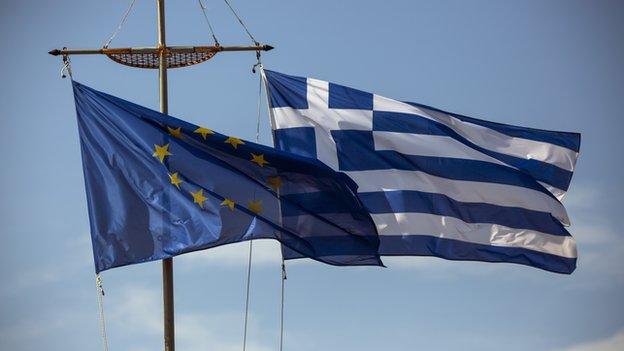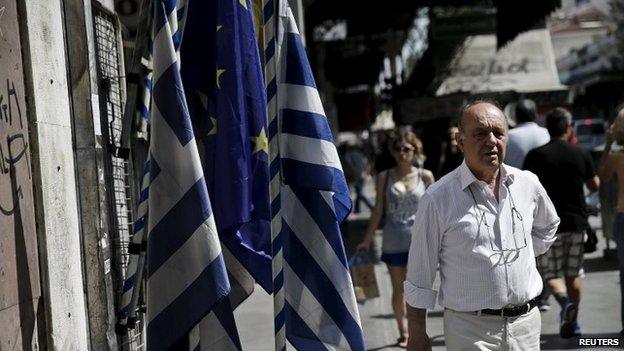Greek central bank warns of 'painful' euro and EU exit
- Published

Greece's central bank has warned for the first time that the country could be on a "painful course" to default and exit from both the eurozone and the EU.
It comes as the Greek government and its international creditors blamed each other for failing to reach a deal over economic reforms.
That failure is holding up the release of €7.2bn (£5.2bn) in bailout funds.
About €30bn was withdrawn from Greek bank deposits between October and April, the central bank added.
The central bank also warned the country's economic slowdown would accelerate without a deal.
Greeks are wondering if they will have to resurrect their past, including their old currency, as James Reynolds reports
"Failure to reach an agreement would... mark the beginning of a painful course that would lead initially to a Greek default and ultimately to the country's exit from the euro area and, most likely, from the European Union," the Bank of Greece said in a report.
"Striking an agreement with our partners is a historical imperative that we cannot afford to ignore."
Greek finance Minister Yanis Varoufakis, when asked if there could be an agreement at the meeting of euro zone finance ministers in Luxembourg on Thursday, said: "I do not believe so."
He said preparatory work for the meeting had not gone far enough for a deal.
Greek shares fell sharply again. The Athens General Index closed 3.2% lower which takes its loss for the past four trading sessions to almost 19%.
'Solidarity'
Austrian Chancellor Werner Faymann was in Athens on Wednesday in a last-ditch bid to end the standoff.
"For Europe to be stronger, it must show solidarity and support to any country which needs it," he said during a meeting with Greek President Prokopis Pavlopoulos.
That came ahead of a meeting of euro zone finance ministers on Thursday although officials have played down expectations of a make-or-break decision being reached.
Greek worker: "I work eighteen hours a day and it's difficult to feed my family"
The Austrian chancellor's comments followed a harsher critique from European Commission President Jean-Claude Juncker, who on Tuesday accused the Greek government of misleading voters, as Greek Prime Minister Alexis Tsipras accused the EU and International Monetary Fund (IMF) of trying to "humiliate" his country.

Greece - deal or no deal?
Option 1: No deal: Greece defaults on IMF and ECB repayments; ECB pulls plug on emergency bank assistance leading to run on Greek banks, capital controls and potential Grexit
Option 2: Greece agrees reform deal with creditors at last minute and avoids default, staying in euro
Option 3: No deal reached but both sides paper over cracks and Greece stays in euro for now
Greece has two weeks remaining to strike a deal with its creditors or face defaulting on an existing €1.6bn (£1.1bn) loan repayment due to the IMF.
The country has already rolled a €300m payment into those due on 30 June.


Mr Juncker said the Greek government had not told the truth about its latest reform proposals.
"I am blaming the Greeks [for telling] things to the Greek public which are not consistent with what I've told the Greek prime minister," Mr Juncker said.
Mr Tsipras has said that the lenders wanted to raise VAT on electricity.

Greek debt talks: main sticking points
Greece will not accept cuts to pension payments or public sector wages, saying two-thirds of pensioners are either below or near the poverty line
International creditors want pension spending cut by 1% of GDP - it accounts for 16% of Greek GDP. They say their target is early retirement not individual pensions
EU officials say Greece has agreed to budget surplus targets of 1% of GDP this year, followed by 2% in 2016 and 3.5% by 2018. Greece says nothing is agreed until everything is agreed
Creditors also want a wider VAT base; Greece says it will not allow extra VAT on medicines or electricity bills
Greece complains creditors focus on increasing taxes instead of cracking down on tax evasion; IMF is concerned Athens is not offering credible reforms

Other Greek ministers have criticised suggestions to increase sales tax on medicines.
But Mr Juncker said: "I'm not in favour, and the prime minister knows that... of increasing VAT on medicaments and electricity. This would be a major mistake."
"The debate in Greece and outside Greece would be easier if the Greek government would tell exactly what the Commission... are really proposing," he added.
Mr Varoufakis claimed that EU proposals did include VAT increases: "Juncker either hadn't read the document he gave Tsipras - or he read it and forgot about it."
Elsewhere in the eurozone, Portugal's short-term borrowing costs rose sharply on Wednesday, with yields on six-month treasury bills jumping from minus 0.002% to 0.044% at the country's latest debt auction.
The rise came despite an assurance to investors from Prime Minister Pedro Passos Coelho that Portugal would not be "the next to fall" in the event of a Greek default.



Greece in numbers
€320bn
Greece's debt mountain
€240bn
European bailout
-
177% country's debt-to-GDP ratio
-
25% fall in GDP since 2010
-
26% Greek unemployment rate